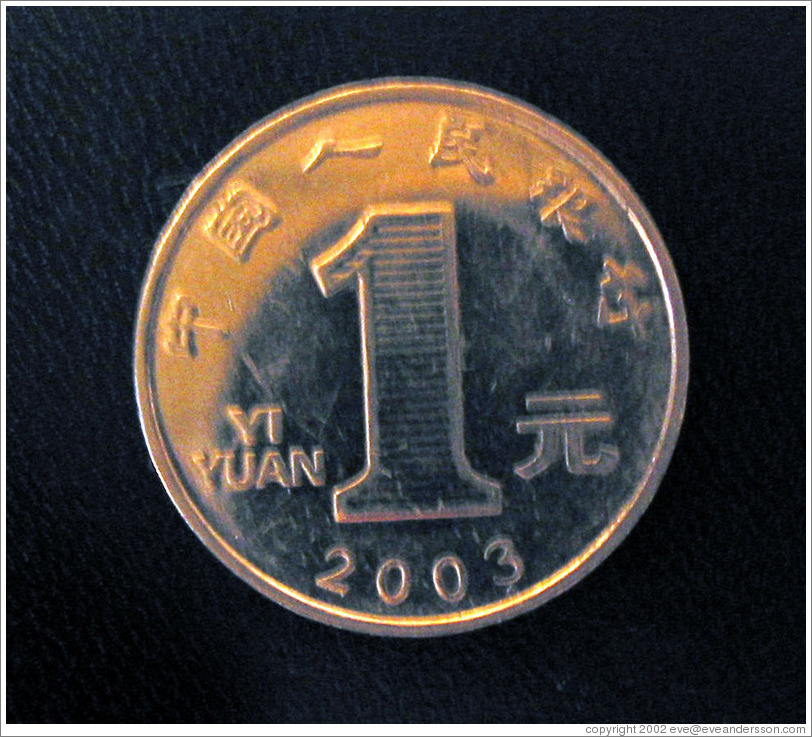
There are very few sure things in the investment world. The ongoing appreciation of the Chinese yuan (or renminbi) against the dollar is one of them. The yuan is currently allowed to float in a carefully controlled range against a basket of foreign currencies, and this range is periodically increased by the Chinese government as they baby step their way toward eventual full convertability of their currency. Some observers believe that full convertability will happen sometime in 2008, possibly in conjunction with the Beijing Summer Olympic Games.
Long-time currency trader and investment advisor Jack Crooks said this about the yuan last month:
"Without a doubt, the Chinese yuan looks poised to appreciate most in the years to come.
China has been suppressing their currency for many years. They believe a weak currency is the key to driving and maintaining export growth. Export growth is critical for them as it creates jobs. And jobs are critical for the ruling elite in China because they are extremely concerned about the potential for social unrest.
But pressure is building for a change in China's currency policy. It will change, and when it does, this currency promises to soar. Eventually, the domestic consumer market will evolve in China, so Chinese will buy the cheap goods they create themselves (rather than importing them to the west).
When that happens, China will no longer have a need to suppress their currency, and the yuan should move dramatically higher to its true value.
Most economists believe the yuan is at least 40-60% undervalued against the dollar. I think it could be much more. Back in the late 80's, the Japanese yen and Japan were in a similar place as China now. Western nations forced the yen higher in value. And it soared around 80-90% in just a few years.
Plus, just in the past few days, China has threatened to use their estimated US$1.33 trillion in U.S. dollar reserves as a political weapon. They're threatening to dump their reserves and deal a deathblow to the U.S. dollar, to retaliate for any trade sanctions imposed by Congress. The fact that they're starting to use their reserves as a bargaining chip is just another bullish factor in favor of the yuan!"
I was living in Japan in the years immediately following the 1985 Plaza Accord, and vividly remember lines of people stretching around the block at banks changing as many dollars for yen as possible on a daily basis as the yen soared from around 240 yen per dollar to well below 200 yen per dollar in a very short period of time. In fits and starts it has continued appreciating since then to the current 114 yen per dollar. That trade was a sure thing since the yen appreciation had been publicly coordinated among several governments, and I did not make nearly as much money on it as I should have. I have been searching ever since then for the next "sure thing," and the coming full convertability of the yuan is it. I do not plan to let this one pass me by - and you shouldn't either.
In the next few posts, I will discuss several simple ways a normal investor or speculator with minimal capital can invest in this next sure thing, starting with the most conservative and moving to more highly leveraged strategies.
Today we will talk about the most conservative - converting dollars to yuan and depositing them in a savings account. Obviously, opening a bank account in China is the most direct way to accomplish this. But aside from the obvious expense involved in traveling there if you do not live and work there already, this is not a wise strategy for large amounts of cash since China is still run by a Communist government that could impose foreign exchange controls at any time. Also, China still makes it very difficult for foreigners to open yuan accounts. Even in Hong Kong, you have to show proof of residency to open a yuan account at a bank, and Bank of China branches located in countries around the world still do not offer yuan accounts to foreigners.
The simplest and easiest way to convert dollar savings accounts to yuan (and the only way as of this writing that I am aware of for non-Chinese investors) is to open an account with Everbank, an online bank that offers many different types of foreign currency accounts, as well as precious metals-based certificates of deposit. They are extremely well capitalized, and as safe as possible considering that it is an online bank. Yuan accounts require a minimum deposit of $10,000 and do not accrue interest. Accounts can be opened at the Everbank web site at: https://www.everbank.com/.
Future postings will explore more leveraged ways to play the ongoing appreciation of the yuan. Warren Buffett once said that an investor only needed two or three really good investment ideas in a lifetime to achieve life-changing investment results. Famed international investor Jim Rogers (co-founder along with George Soros of the Quantum Fund) recently announced that he is moving to Shanghai and converting ALL of his dollar holdings to the yuan, yen, and Swiss franc, stating that he expected the yuan to triple or even quadruple over the coming decades. The appreciation of the yuan is definitely one of Buffet's "life-changing" ideas.
No comments:
Post a Comment